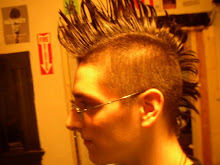It is highly probable that humans are made of nanobiological machine factories called 'cells'. These cells transmit and receive information from one another by field electricity and hz signals.
Nanoscale robots can currently assemble tiny particles of metal and other materials. Biology has demonstrated that many of the best nanoscale data transfer and assembly code is biological. Biological factories carry electricity well and are excellent at using field signal. We currently wire machines for use of direct signal, but a perfect circuit array is by field.
Arguably, a species' co-communication is by field signal.
We are probably massively engineered computer/robots, built using biological components. Our genesis and evolution probably took several million years, monitored by an advanced engineering race, who themselves formed from the forcible psychic organization of biology into suitable electromagnetic hosts, capable of sustaining a joyful and perpetuating electromagnetic reaction. Basically, life is a proof.
We have shifted our focus from the electromagnetic factor of our lives to the chemical reactions and conditions. Knowing the EM and quantum events are arguably more important or just as important.
Monday, July 30, 2007
Saturday, July 28, 2007
Nice Dredging
This article in New Scientist dot com is about artificial genesis.
"Can conception, the most intimate of human experiences, be automated?
Teruo Fujii of the University of Tokyo in Japan and his colleagues are building a microfluidic chip to nurture the first stages of pregnancy. They hope, eventually, to create a fully automated artificial uterus in which egg and sperm are fed in at one end and an early embryo comes out the other, ready for implanting in a real mother. They say using such a device could improve the success rate of IVF.
"While there have been many advances in the production of in vitro embryos, these embryos are still sub-optimal [compared] to their in vivo counterparts," says Matt Wheeler of the University of Illinois in Urbana-Champaign who is also working on automated IVF systems. One reason for this is that during IVF, eggs or embryos are often moved or washed with culture fluid, causing changes in temperature and pH, he says."
"Can conception, the most intimate of human experiences, be automated?
Teruo Fujii of the University of Tokyo in Japan and his colleagues are building a microfluidic chip to nurture the first stages of pregnancy. They hope, eventually, to create a fully automated artificial uterus in which egg and sperm are fed in at one end and an early embryo comes out the other, ready for implanting in a real mother. They say using such a device could improve the success rate of IVF.
"While there have been many advances in the production of in vitro embryos, these embryos are still sub-optimal [compared] to their in vivo counterparts," says Matt Wheeler of the University of Illinois in Urbana-Champaign who is also working on automated IVF systems. One reason for this is that during IVF, eggs or embryos are often moved or washed with culture fluid, causing changes in temperature and pH, he says."
Subscribe to:
Comments (Atom)
